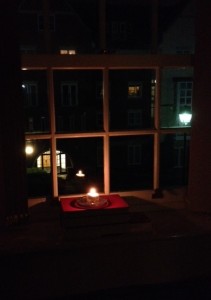Lights Out 2014: Remembering 4th August 1914

100 years on
I walked home on Monday night (4th August) through my ward, of Harrow on the Hill. Many homes were darkened with just a solitary candle in their windows marking the start of the First World War—and, as I walked, I reflected upon the awful loss of life and the shattering of peace, prosperity and hope for so many.
I have visited many of the First World War battlefields, cemeteries and memorials, and they never fail to move me. Their sheer scale; the number of crosses are testament to the courage of so many young men to serve and give their all in a conflict whose sheer scale is nigh impossible to comprehend, a conflict fought so brutally in unimaginably awful conditions. Always I wonder, what would the 20th Century been like had those eventful days of summer 1914 not ended in war.
Sir Edward Grey rightly said of the events of the summer of 1914 and Britain’s declaration of war on August 4th that: “The lamps are going out all over Europe, we shall not see them lit again in our lifetime.”
WWI ushered in a century of barbarism and savagery. The industrial-scale slaughter at the front was to give way to the consequences of that slaughter: of the millions dead, how many inventions, works of art and scientific breakthroughs have gone unmade? How many families lost fathers, sons, brothers, husbands? How many women failed to find husbands, how many children weren’t born into the world? How much wealth – of human, social and material capital – was destroyed in that orgy of violence?
How many of the disasters that befell the post-war world were avoidable? What might have happened without the hyperinflation of Germany, Austria and Hungary that flowed from their attempt to fund the war without as much direct taxation as the Allied Powers? Would they have avoided the terrible damage wrought by the war to their economies, would they have sunk into extremism and dictatorship? Could the collapse of Tsarist Russia into the hell of the Communism of the Soviet Union have been avoided? Would the 1919 Flu been less severe had not the world been shattered and starved by war?
75 years after Grey described how the lights were going out all over Europe, the lights began to come on… In the summer of 1989, the world watched as convoys of cars carrying thousands of desperate young East Europeans fled through gaps in the Iron Curtain… a year that ended with the Berlin Wall being toppled.
In this new century, 100 years after the start of the First World War, we should pay heed to Sir Edward Grey’s prediction; we should reflect on the damage done by war to society and to individuals and their loved ones; and we owe it to the memory of those who fell in Flanders’ Fields and the other battlefields of WWI, and in subsequent wars, to learn from the events of August 4th 1914. We should do what we can to promote the antithesis of war: peace, freedom and trade.
[For more details on the Lights Out event and for the Royal British Legion’s page listing events marking the Centenary of the outbreak of World War One.]